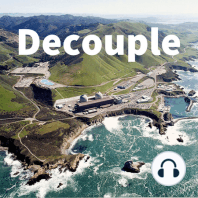86 min listen
Why Nuclear Energy Has Been a Flop feat. Jack Devanney
FromDecouple
ratings:
Length:
51 minutes
Released:
Jun 17, 2021
Format:
Podcast episode
Description
At its birth, nuclear energy entered a highly competitive market for electricity generation. Oil was so cheap that it was stealing market share for electricity generation from coal and driving prices to all-time lows. Despite being a brand new technology 1960s nuclear plants were hitting prices of 3 cents/kWh in today's dollars. Gaddafi and OPEC then contributed to the price of oil skyrocketing. All of a sudden, many wanted to build a nuclear plant and early adopters were reaping huge profits. Nuclear energy featured prominently in the 1964 US democratic party platform. Democrats in the USA even threatened private utilities that if they would not build more nuclear reactors the government would start public utilities that would. So what happened? The Rockefeller Foundation was plagued by guilt over its role in supporting the science that led to the atomic bomb. In fact Ernest Lawrence the inventor of the cyclotron wrote to them to tell them that “had it not been for the Rockefeller Foundation there would be no bomb.” In an attempt to atone for its pivotal role the Foundation became invested in promoting the linear no-threshold (LNT) model for radiation-induced harms as a tool to fight atmospheric weapons testing and try to force the atomic weapons genie back into the bottle. LNT was accepted by the nuclear establishment in part because of hubris. The thinking was that it didn't really matter what radiation model was in place and how conservative it was since a core meltdown and radioactive release were thought to be impossible. LNT laid the groundwork for a regulatory paradigm that has plagued the nuclear industry since, “ As low as reasonably achievable. (ALARA) What “reasonably achievable” meant was really “what can you afford?” Because early on nuclear was very profitable in the context of the oil crisis and escalating fossil fuel costs there was a lot of room to maneuver in terms of adding on more and more costly features to reduce radioactive emissions that had no impact on health. The regulatory ratchet only tightens one way, so when the coal industry got its costs under control the inflated costs imposed by ALARA on nuclear prevented it from becoming cost-competitive again. ALARA means that nuclear can never be cheaper than its rivals because it is only reasonable that it spends any difference on measures to reduce any radioactive emissions to near zero. As Jack Devanney the principal engineer and architect of THORCON and author of “Why nuclear energy has been a flop” explains, the boom of nuclear power in the USA in particular was short-lived. No new nuclear plant was ordered in the 20th century after 1974, 5 years before the Three Mile Island accident. Interestingly the safety performance of the pre-ALARA early fleet has been exemplary and TMI was the most recent design. Jack Devanney argues that accidents will happen but emphasizes that their health consequences will be very minor as dose rates that the public experiences that are even 10-20x average background rates are not a health hazard in any meaningful sense.
Released:
Jun 17, 2021
Format:
Podcast episode
Titles in the series (100)
The Malthusian Spectre Haunting Environmentalism feat. Michael Shellenberger by Decouple
